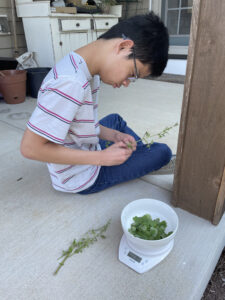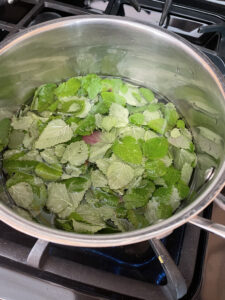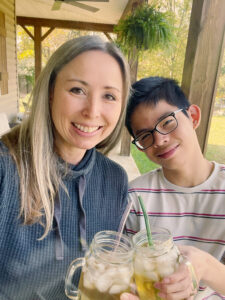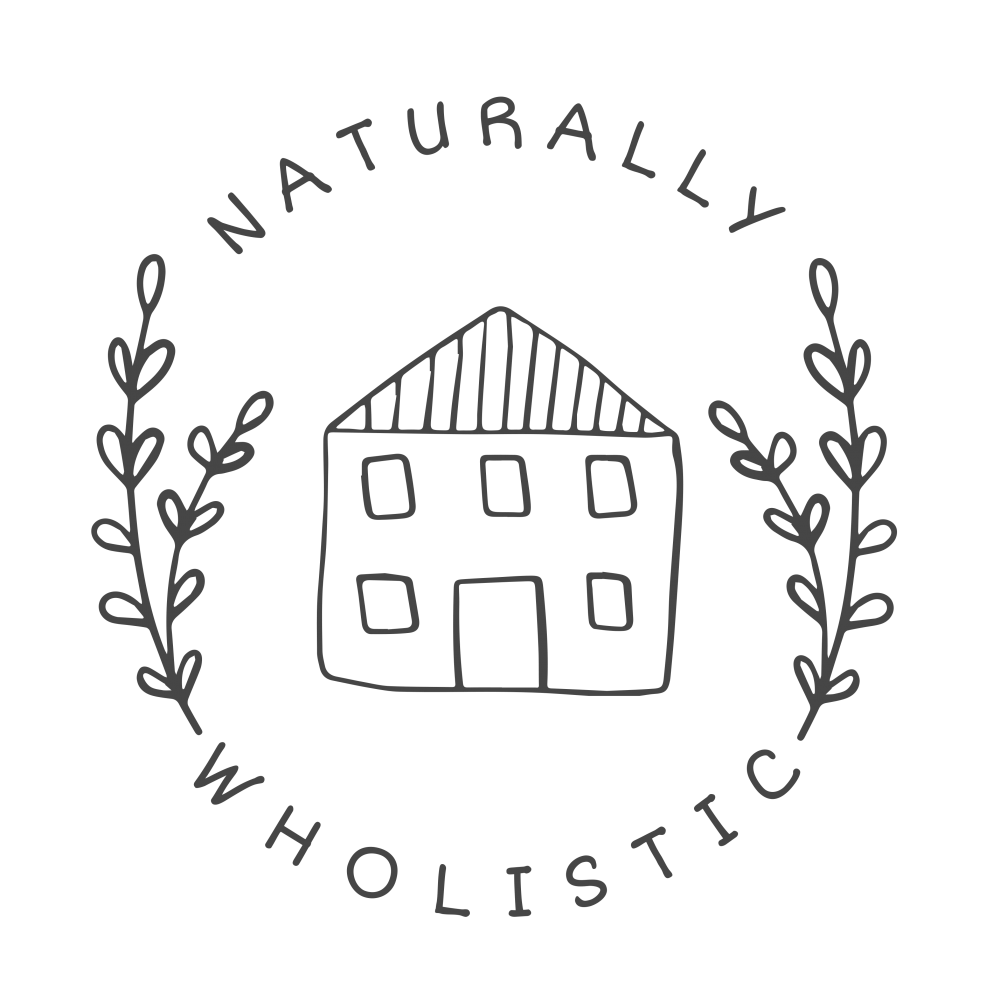.jpg) My son and I are working through Campfire Curriculum’s Natural Medicine unit study and it’s been so enjoyable! He loves learning about how to use herbs and it holds me accountable to actually do the activities. A couple weeks ago, we made a fresh lemon balm infusion! I have so much lemon balm growing that it can tend to take over unless I cut it back somewhat regularly, so it seemed like a perfect choice to practice our infusion-making skills. Several other herbs would have been great additions (like chamomile, lavender, or hibiscus) but not many of my other fresh herbs are harvestable in the cooler temps. Sage may have been a fun one to add also, but there are so many health benefits packed into just lemon balm, so we went with it!
My son and I are working through Campfire Curriculum’s Natural Medicine unit study and it’s been so enjoyable! He loves learning about how to use herbs and it holds me accountable to actually do the activities. A couple weeks ago, we made a fresh lemon balm infusion! I have so much lemon balm growing that it can tend to take over unless I cut it back somewhat regularly, so it seemed like a perfect choice to practice our infusion-making skills. Several other herbs would have been great additions (like chamomile, lavender, or hibiscus) but not many of my other fresh herbs are harvestable in the cooler temps. Sage may have been a fun one to add also, but there are so many health benefits packed into just lemon balm, so we went with it!
Lemon Balm (Melissa Officinalis) is an easily-cultivated mint family perennial herb in our growing zone (7B), but it’s grown throughout the world too. It has a lovely lemon scent and is popular with pollinators (so it’s great for the bees!). Although it’s traditionally known to be beneficial for multiple purposes, the European Medicines Agency (EMA) lists only three main uses for lemon balm (EMA, 2013):
- To sooth mild symptoms of of stress, including for anxiety, nervousness, depression, (Groves, 2019) and also mood regulation (Kennedy et al. 2003)
- To ease mild gastrointestinal upset, including spasms and flatulence
- To support healthy sleep
.jpg) Many other uses for lemon balm have been recorded though:
Many other uses for lemon balm have been recorded though:
Antimicrobial and antiviral. Lemon Balm’s antimicrobial properties may explain the topical use for ulcers as well as other skin wounds (Hăncianu, et. al 2008), in addition to the external application on cold sores (Mills & Hutchins, 2013). As well, the herb’s antiviral and calming properties also suggest use for shingles and chicken pox (Chevallier, 2000), in addition to supporting the body during fever. It’s even mild enough to use for children (Gosling, 2017).
Mental & emotional regulation. Lemon balm has been found to soothe restlessness and nightmares in children (Gladstar 2012), especially when combined with valerian and passion flower. It can also improve memory and concentration (Easley & Horne, 2016) and can be helpful for ADHD, (Winston & Maimes, 2019), including for symptoms of hyperactivity, concentration issues, and impulsiveness (Gromball et al., 2014). It also shows promise for improved cognitive function in Alzheimer’s disease (Akhondzadeh et al., 2003). Lemon balm was even referenced by my favorite Medieval herbalist nun Hildegard von Bingen (1098-1179). She wrote that whoever eats it will be merry and laugh a lot because of its warming energy on the spleen.
Antioxidant support. Lemon balm contains quercetin, luteolin, and apigenin, which provide antioxidant and neuro-protective properties. A 2011 study suggests that lemon balm may be protective against oxidative DNA damage from radiation as well (Zeraatpishe et al.). Researchers found that drinking 2 cups of lemon balm tea per day for one month increased antioxidant activity and decreased DNA damage.
Hopefully I have convinced you to try lemon balm! Here’s how to make a fresh cold infusion …
Ingredients
- 1 ounce fresh lemon balm leaves, larger stems removed
- 3 cups filtered water
- honey to taste
Instructions
- Wash the lemon balm leaves if needed (I skipped this step, but please wash if you aren't sure from where the leaves came).
- In a medium saucepan, bring the 3 cups of water to a boil.
- Place the lemon balm leaves in the sauce pan and turn the heat to low. Make sure the leaves are completely submerged in the water.
- Simmer for 10 minutes with the lid mostly covering the pan to allow steam to escape.
- Turn off the stove and strain the leaves out of the water, squeezing the liquid from them to preserve all the goodness.
- Mix in a bit of honey until dissolved.
- Pour over 2-3 cups of ice and enjoy!



![]()
References
Akhondzadeh, S., Noroozian, M., Mohammadi, M., Ohadinia, S., Jamshidi, A.H., & Khani, M. (2003). Melissa officinalis extract in the treatment of patients with mild to moderate Alzheimer’s disease: A double blind, randomised, placebo controlled trial. Journal of Neurology, Neurosurgery, and Psychiatry, 74(7), 863-866. https://doi.org/10.1136/jnnp.74.7.863
Chevallier, A. (2000). The encyclopedia of herbal medicine. DK Publishing.
European Medicines Agency. (2013, May 14). Assessment report on Melissa officinalis L., folium. https://www.ema.europa.eu/en/documents/herbal-report/final-assessment-report-melissa-officinalis-l-folium_en.pdf
Gosling, R. (2017). Nursing your child at home: Supporting your child through fever naturally. Matador.
Gladstar, R. (2012). Rosemary Gladstar’s medicinal herbs: A beginner’s guide. Storey Publishing.
Gromball, J., Beschorner, F., Wantzen, C., Paulsen, U., & Burkart, M. (2014). Hyperactivity, concentration difficulties and impulsiveness improve during seven weeks’ treatment with valerian root and lemon balm extracts in primary school children. Phytomedicine, 21(8-9), 1098-1103. https://doi.org/10.1016/j.phymed.2014.04.004
Groves, M.N. (2019). Grow your own herbal remedies: How to create a customized herb garden to support your health and well-being. Storey Publishing.
Hăncianu, M., Aprotosoaie, A.C., Gille, E., Poiată, A., Tuchiluş, C., Spac, A., & Stănescu, U. (2008). Chemical composition and in vitro antimicrobial activity of essential oil of Melissa officinalis L. from Romania. Revista Medico-Chirurgicala a Societatii de Medici si Naturalisti din Iași, 112(3), 843-847.
Kennedy, D.O., Scholey, A.B., Tildesley, N.T., Perry, E.K., & Wesnes, K.A. (2003). Modulation of mood and cognitive performance following acute administration of Melissa officinalis (lemon balm). Pharmacology, Biochemistry, and Behavior, 72(4), 953-964. https://doi.org/10.1016/s0091-3057(02)00777-3
Mills., S., & Hutchins, R. (Eds.). (2013). ESCOP Monographs: The scientific foundation for herbal medicinal products. Melissae folium: Melissa leaf. European Scientific Cooperative on Phytotherapy. https://escop.com/wp-content/uploads/edd/2015/09/Melissa.pdf
Winston, D., & Maimes, S. (2019). Adaptogens: Herbs for strength, stamina, and stress relief. Healing Arts Press.
Zeraatpishe, A., Oryan, S., Bagheri, M.H., Pilevarian, A.A., Malekirad, A.A., Baeeri, M., & Abdollahi, M. (2011). Effects of Melissa officinalis L. on oxidative status and DNA damage in subjects exposed to long-term low-dose ionizing radiation. Toxicology and Industrial Health, 27(3), 205-212. https://doi.org/10.1177/0748233710383889







